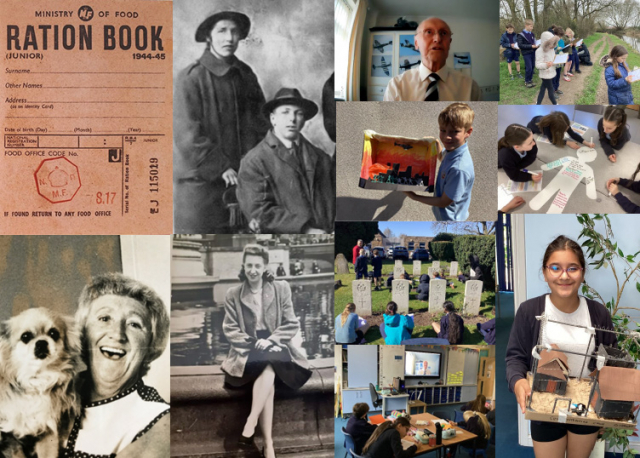Young Historian Awards 2025 – the winners

Young Historian Awards principal winners 2025
Spirit of Normandy Trust Senior
Avani De Santis [Guildford Grammar School, Western Australia]
Kyle Luk [Loughborough Grammar School]
Caspar Wright [Wells Cathedral School]
Spirit of Normandy Trust Key Stage 3
Anne Andrews [St Mary’s Menston Catholic Voluntary Academy, Leeds]
Rafferty Ludlow-Maisey [Crypt Grammar School, Gloucester]
Robert Moczynski [Queen Elizabeth Grammar School, Wakefield]
Spirit of Normandy Trust Primary
St Stephen’s Primary School, Fradley, Staffordshire
World War I [KS3]
Tom Wakeling [Stoke Newington School]
Isabelle Leung [Royal High School, Bath]
Kaan Cortuk [Wilson’s School, Wallington]
World War I [GCSE]
Rowan Hall [Longridge High School, Preston]
Edward Shek [Harrow School]
Modern Studies [GCSE]
Isaac Hussey [Lancing College]
Local History [Primary]
Eltham College Junior School
Local History [KS3]
Harjit Thiagarajan [Wilson’s School, Wallington]
Esha Maruthainus [Notting Hill and Ealing High School]
Local History [GCSE]
Isabella Duncan [Burford School]
Elvira Harrison [Berkhamsted School]
Local History [Post-16]
Max Warren [Tonbridge School]
Nabeeha Haque [Newham Collegiate Sixth Form College]
Ancient Civilisations [Primary]
Eltham College Junior School
Wilbury Primary School, Edmonton
School History Magazine
Sherborne Girls School
St Paul’s School, London
The annual Young Historian Awards are now proving to be an excellent showcase for the best of historical writing among young people. The awards are attracting strong interest from students, teachers, parents and even youth workers as they seek to celebrate what young people can achieve in their historical investigations. From pioneering female archaeologists to the impact of the Dagenham Strikes, the competition continues to highlight the events and topics that fire the imaginations of young historians from 7 to 19 as we await the outcome of the curriculum review.
This year we have received a record entry of 267, simply the highest ever since these awards began back in 1987, representing 88 schools, itself an increase of 25% on the previous year.
Supported by our two external sponsors, the very generous Spirit of Normandy Trust and Classics for All who support our Primary Ancient Civilisations category, the remaining funding arises from individual donations, book sales and contributions from the Mid-Trent and Mercia and Nuneaton Branches of our Association. We are also delighted that this year the Awards have been supported by the ‘The Little Histories’ series of books from Yale University Press.
One of the very positive developments has been the increase in entries from the maintained sector, especially at primary level, and also the flow of entries from overseas – fourteen this year. With the latter sometimes, we are just impressed by the fact that young people from around the world have been encouraged to take part and we admire their enthusiasm, especially as many will be writing in their second language. We are anxious to support such students but please do contact us if you are unsure how to define ‘local history’, or unsure about the Spirit of Normandy Trust requirement that their Second World War entries should relate to the wider British and Allied aspects of the War.
Having said that, this year’s winning entry in the Spirit of Normandy category was offered by Avani De Santis of Guildford Grammar School in Western Australia for a discussion of the Special Air Service, of such quality that it was universally recognised as the winner.
We really enjoy the efforts of students who identify and develop very unusual perspectives. This year the winning Spirit of Normandy Trust entry at KS3 was an investigation into the ‘secret listening’ network in Britain during the War which supported the activities of Bletchley Park. Another entry, about which we were very enthusiastic, was a Y7 entry in the KS3 competition which explained the underground activity of Polish patriots as they tried to disrupt German and Russian activity during and at the end of the war. Two further specific examples are important to mention: one is a Modern Studies entry which explained and evaluated the role of music in the concentration camps during the War; and another an exploration of how the effect of the Great War contributed to the Vietnamese independence movement.
In Local History the analysis of the Witney Blanket industry, the emergence of Quakerism in Buckinghamshire, the ‘Great Camp’ at Chobham in 1853 and a consideration of Hainault Forest were highlights. In Ancient Civilisations there was a very substantial increase in entries and we enjoyed a variety of international themes, from the Mesoamerican civilization, to the history of Jericho, Chinese culture, and the Egyptians.
We do have some schools which are regular participants and we do appreciate their support. It would be invidious to name them but anyone who peruses our awards list each year will recognise the regulars. Equally these lists also reveal many welcome newcomers.
One final point: such is the quality of our young scholars’ work that several items are being considered for publication in The Historian, as has happened previously, but in addition an entry on the role of Croydon Airport is being actively considered for the Bulletin of the Croydon Natural History and Scientific Society; and another entry from the same school – on the role of animals in the Great War – is being serialised for inclusion in the Mid-Trent and Mercia Historian. Look out for news of next year’s competition through HA News and social media. Will 2026 be the year when you or your students see their first piece of historical writing go into print?

